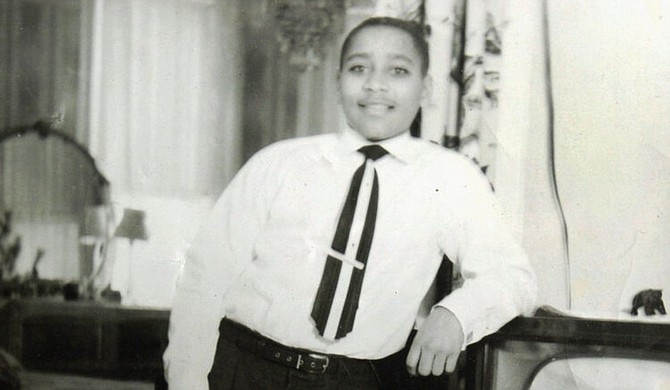The U.S. Justice Department said Monday it is ending its investigation into the 1955 lynching of Emmett Till, the Black teenager from Chicago who was abducted, tortured and killed after witnesses said he whistled at a white woman in Mississippi. Photo courtesy Simeon Wright
JACKSON, Miss. (AP) — The U.S. Justice Department said Monday it is ending its investigation into the 1955 lynching of Emmett Till, the Black teenager from Chicago who was abducted, tortured and killed after witnesses said he whistled at a white woman in Mississippi.
The announcement came after the head of the department's civil rights division and other officials met with several of Till's relatives.
Till's family members said they were disappointed there will continue to be no accountability for the infamous killing, with no charges being filed against Carolyn Bryant Donham, the woman accused of lying about whether Till ever touched her.
“Today is a day we will never forget," Till's cousin, the Rev. Wheeler Parker Jr., said during a news conference in Chicago. "For 66 years we have suffered pain. ... I suffered tremendously.”
The killing galvanized the civil rights movement after Till’s mother insisted on an open casket, and Jet magazine published photos of his brutalized body.
The Justice Department reopened the investigation after a 2017 book quoted Donham as saying she lied when she claimed that 14-year-old Till grabbed her, whistled and made sexual advances while she was working in a store in the small community of Money. Relatives have publicly denied that Donham, who is in her 80s, recanted her allegations about Till.
Donham told the FBI she had never recanted her accusations and there is “insufficient evidence to prove beyond a reasonable doubt that she lied to the FBI,” the Justice Department said in a news release Monday. Officials also said that historian Timothy B. Tyson, the author of 2017's “The Blood of Emmett Till,” was unable to produce any recordings or transcripts in which Donham allegedly admitted to lying about her encounter with the teen.
“In closing this matter without prosecution, the government does not take the position that the state court testimony the woman gave in 1955 was truthful or accurate,” the Justice Department release said. “There remains considerable doubt as to the credibility of her version of events, which is contradicted by others who were with Till at the time, including the account of a living witness.”
Tyson said in a statement Monday that he gave the FBI information from two interviews he did with Donham. He said those “did not change the prospect of prosecution in this case.”
“But our knowledge of her lying in court does not at all depend on those interviews, as I explain on page six of The Blood of Emmett Till,” he said.
“Since nothing Carolyn Bryant Donham said in our two interviews implicated any living person, including herself, at the time I did not think them particularly newsworthy. The only crime she admitted to me was perjury, and that she had lied was news to no one. The statute of limitations for perjury in Mississippi was two years, so she had been beyond prosecution since the fall of 1957 on that charge,” Tyson said.
Thelma Wright Edwards, one of Till's cousins, said she was heartbroken but not surprised that no new charges are being brought.
“I have no hate in my heart, but I had hoped that we could get an apology, but that didn’t happen," Edwards said Monday in Chicago. "Nothing was settled. The case is closed, and we have to go on from here.”
Days after Till was killed, his body was pulled from the Tallahatchie River, where he had been tossed after he was shot and weighted down with a cotton gin fan.
Two white men, Roy Bryant and his half-brother J.W. Milam, were tried on murder charges about a month after Till was killed, but an all-white Mississippi jury acquitted them. Months later, they confessed in a paid interview with Look magazine. Bryant was married to Donham in 1955.
The Justice Department in 2004 opened an investigation of Till’s killing after it received inquiries about whether charges could be brought against anyone still living. The department said the statute of limitations had run out on any potential federal crime, but the FBI worked with state investigators to determine if state charges could be brought. In February 2007, a Mississippi grand jury declined to indict anyone, and the Justice Department announced it was closing the case.
Bryant and Milam were not brought to trial again, and they are now both dead. Donham has been living in Raleigh, North Carolina.
The FBI in 2006 began a cold case initiative to investigate racially motivated killings from decades earlier. A federal law named after Till allows a review of killings that had not been solved or prosecuted to the point of a conviction.
The Emmett Till Unsolved Civil Rights Crime Act requires the Justice Department to make an annual report to Congress. No report was filed in 2020, but a report filed in June of this year indicated that the department was still investigating the abduction and killing of Till.
The FBI investigation included a talk with Parker, who previously told the AP in an interview that he heard his cousin whistle at the woman in a store in Money, but that the teen did nothing to warrant being killed.



Comments
Use the comment form below to begin a discussion about this content.
comments powered by Disqus